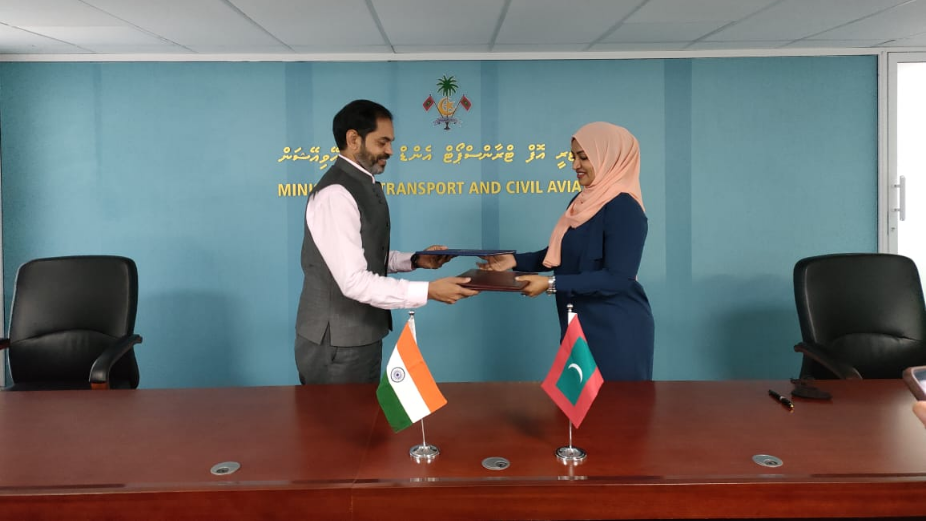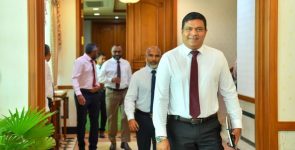
To augment security, safety and marine environment protection in the region, on 30th September, the Republic of India and the Republic of Maldives signed MoU on ‘Augmenting Marine Safety, Security and Environment Protection in the region through cooperation in the long-range identification and tracking of ships (LRIT) System”. The MoU was signed by Sh Sunjay Sudhir, High Commissioner of India and Ms Aishath Nahula, Minister of Transport and Civil Aviation.
With the signing of MoU, Maldives will be able to utilise the services of Indian LRIT – National Data Centre (NDC) & its ‘LRIT’s Conformance Tests’ facility at “No Cost Basis” thereby assisting Maldives to fulfill its obligations as IMO member related to LRIT without requiring to maintain separate NDC. Both countries agreed to identify areas of co-operation in ‘Maritime Assistance Service’, ‘Marine Contingency Management Systems’ and capacity building in the related matters through mutual training programmes, experience and knowledge sharing.
After the 9/11 attacks, security analysts world over realized the security threat posed by hijacked inflammable material carriers. As a result of various discussions and deliberations on the threat posed by such hijacked platforms, especially highly inflammable oil carrying ships on the Blue Economy, Long Range Identification and Tracking (LRIT) of ships was proposed at the International Maritime Organization (IMO) in London. This led to formulation of many systems like the Automatic Identification System using land based and satellite based responders. All these systems are aimed at enhancing the Maritime Domain Awareness so that rogue and suspected rogue ships could be identified well before they could be used to target some coastal taget. For a maritime nation like Maldives which is comprised 99% of water, every significant infrastructure can be an imminent target for such nefarious activity. Therefore, continuous surveillance and absolute Maritime Domain Awareness in the EEZ are an essential requirement for ensuring safety of Maldives.
LRIT was established as an international system on 19 May 2006 by the International Maritime Organization (IMO) and it is mandatory for all governments which have contracted to the IMO. This system provides for the global identification and tracking of ships to enhance security of shipping and for safety and marine environment protection. It collects and disseminates vessel position information received from IMO member States ships that are subject to the International Convention for the Safety of Life at Sea (SOLAS). In turn, IMO states are required to register all 300 tons and bigger ships on this IMO system. The system tracks these ships and sends data of ships within 1000nm from their shores which enhances the Maritime domain awareness of the member state. For utilization of these services a periodic fee is to be submitted by the states to IMO
India also maintains a National Data Center (NDC) that was set up in July 2009 and upgraded in 2016 to support the requirements of the regional states. It is the repository of the LRIT information (i.e. ship positional data) and is connected to the wider International LRIT system via the International Data Exchange (IDE) using a specific LRIT communications protocol. NDC is manned round the clock and has a complete back up or a disaster recovery centre at DNCO New Delhi. The NDC continuously monitors Indian ships on international trade all over the world.
The owners & managers of shipping companies are also provided restricted access to LRIT monitoring through the web so that they can continuously monitor only their own vessels and can update the data required by the Directorate General of Shipping. This allows continuous monitoring of ships and any issue like hijacking, accident or incident like in the case of Navios Amaryllis off Kaafu atoll in August this year is promptly brought to the fore. Indian LRIT NDC has been providing LRIT services to Sri Lanka since October 2014.
Signing of LRIT Agreement today is another example of India and Maldives working together for shared interests particularly on issues of security and economic benefit.











